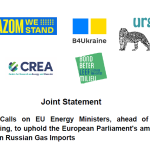Following the publication of the report ‘Phase-out 2020: Monitoring Europe’s fossil fuel subsidy phase out’, this briefing provides a set of recommendations to the EU on how it can better align its public financing – including some of its key policies, instruments and institutions – with the long-term objectives of the Paris Agreement.
With the adoption of the Paris Agreement on climate change in 2015, followed by its entry into force in 2016, the EU and its Member States have demonstrated their ambition to limit the increase in global average temperature to well below 2°C degrees, and to pursue efforts to limit global temperature rise to an even more ambitious 1.5°C target.
An important objective of the Paris Agreement stipulates that financial flows need to be made “consistent with a pathway towards low greenhouse gas emissions and climate-resilient development.” The Paris Agreement requires a major overhaul of not just climate and energy policies in the EU, but also
financial policies and investments to ensure a fair and ambitious shift towards renewable energy, energy savings and climate resilience. Importantly, in consequence it requires the EU and its Member States to immediately end all public financial support for fossil fuels and to address the EU policies, mechanisms and instruments that directly and indirectly finance fossil fuels.
Read the full EU Briefing on Policy Recommendations Fossil Fuel Subsidies Phase Out Oct 2017 here
This briefing was made in collaboration with Friends of the Earth Europe, WWF, CEE Bankwatch Network and Counter Balance



